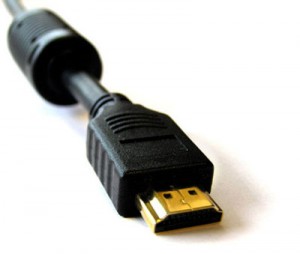How long can you go with an HDMI cable before
suffering loss of image quality?
 Most purchasers of HDMI cable are using the technology just for transferring a signal from a digibox or games machine to a nearby TV screen, and for these individuals there are few complications regarding HDMI length. However, when using HDMI for more remote installations or complex networks such as CCTV, there may be occasions when longer lengths of HDMI cable are required for the job, so the question remains: how long is too long?
Most purchasers of HDMI cable are using the technology just for transferring a signal from a digibox or games machine to a nearby TV screen, and for these individuals there are few complications regarding HDMI length. However, when using HDMI for more remote installations or complex networks such as CCTV, there may be occasions when longer lengths of HDMI cable are required for the job, so the question remains: how long is too long?
Normal cabling
For typical installations of 1 – 2m, your average cabling which is supplied with your equipment should cope fine. Most of these will work fine with CCTV systems up to 5m from your DVR, and if you are using anything less than 720p / 1080i resolution you should be able to go up to 15m without significant loss of quality. However, the image resolution is a major deciding factor in the distance you can go from your DVR unit with your HDMI cable. Systems which are capturing and transferring images in 1080p or greater resolution on a bog standard, category 1 HDMI cable will find problems with image attenuation and flicker very quickly, as this cable is not designed to take such a wide bandwidth signal over any great distance.
Types of cabling
HDMI cables can be split into two main categories. Category 1 certified cables have been tested at 74.5 MHZ will support 720p and 1080i60 resolution images, whereas category two cables have been tested at 340 MHz and will support 1080p and 2160p. Category 1 cables under 5m can often be used successfully on a 1080p set up, but this is not guaranteed. For an assurance of image quality with 1080p HD video, choose category 2 cabling even for shorter runs. If you plan to run the system over a greater distance then category 2 will be essential.
Boosters, extenders and converters
If you are looking at going just beyond the 15m critical range for standard HDMI cabling, you may get away with using an inexpensive and easy to install signal booster, which will amplify the signal just enough to reduce loss of quality on runs of between 15 – 20m. Depending on what equipment you are connecting the HDMI into, you may find your own equipment has a built in regulator which will help to stabilise the image just slightly over the 15m threshold.
HDMI extenders are available which can be used to connect shorter lengths of cable together to achieve the required distance. Be careful to stay within the 15m range if you are doing this, or use one or two signal amplifiers or boosters to keep the image crisp. This method is not recommended for runs of over 30m.
For really long distances, HDMI converters can convert cable into two CAT5e/6 cables and back into HDMI, enabling distances of up to 250m to be achieved. However, a loss of resolution will almost definitely occur during the conversion process, especially if the system is not well designed. Images can also be converted to run over fibre optic which can allow for distances of up to 300m, but these converters are often cost prohibitive and can also reduce image quality to some extent.
Conclusion
There is no definitive right and wrong answer to how to solve the HDMI length question. For typical installations using 1 – 2m of cabling, the standard, cheap HDMI cabling should be fine at standard or 720p / 1080i definition. For longer runs of up to 15m a better quality cable should definitely be sought of a good, certified category 2 standard. Runs of over 15m will be more of a concern, and it’s hard to know what will work for you without trying it. IF you know your images are going to be low resolution then a lower quality of cable or a conversion to Cat5/6 or fibre may be viable, but for future proofing your system it is better to go with a better quality cable to be on the safe site. With any installation where you are hiding cables in ducting, under floors or in ceilings, it is important to weigh up the saving you will be making on the inexpensive cable with the potential cost of accessing and relaying a better cable at a later date.
What’s next?
We regularly run CCTV installation and Maintenance courses. With us, you can really dive into CCTV technology. Our 2-day CCTV courses are highly practical. Check out the details about our upcoming CCTV Installation Courses here.
